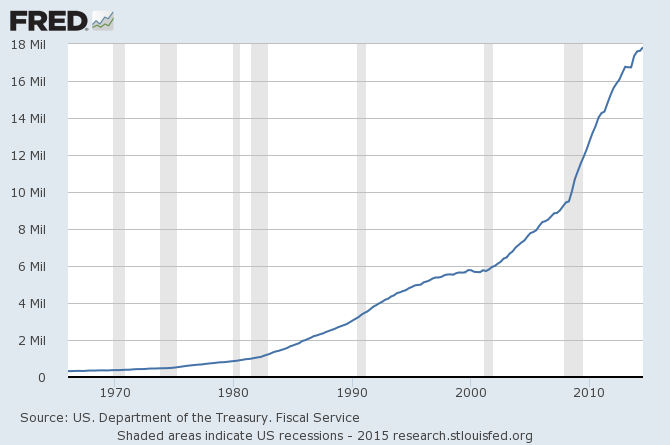U.S. Government Debt Is Now at a Once-Unimaginable LevelBy Robert HiggsThe Beacon Feb. 13, 2015 |
Popular 
Rep. Randy Fine: Pro-Palestine Movement Are 'Demons' Who 'Must Be Put Down by Any Means Necessary'

Trump Confronts South African President on White Genocide

ADL Responds to DC Shooting With Call to Deplatform Twitch Streamer Hasan Piker

Israeli PM Netanyahu: Trump Told Me 'I Have Absolute Commitment to You'

Trump, After Rearming Israel, 'Frustrated' With Netanyahu for Expanding War
 Earlier today I was looking through some old records, and I came across a flyer for a symposium in which I participated at Seattle University early in 1990. The flyer announced the symposium topic by asking: “A $3 Trillion National Debt: Does It Matter? What Can We Do About It?” The topic seemed timely enough, given that the gross federal debt has just passed the $3 trillion mark for the first time and was rising at a brisk pace. Back then, $3 trillion seemed like “real money,” so some people were rightly concerned about the consequences of such large and growing public indebtedness. At the time, I occupied the Thomas F. Gleed Chair in the university’s Albers School of Business and Economics. The symposium was sponsored by the Political Science Department and featured three speakers: besides me, there was my friend and colleague Richard Young, a professor of political science, and a political hack by the name of Mike Lowry, who had a loose attachment to the university under the aegis of its Institute of Public Service. Lowry had previously served five terms in the U.S. House of Representatives and had twice failed in his attempts to gain election to the U.S. Senate. Being a man who almost visibly lusted after high office, however, he did not give up his attempts to get elected to some political position, and in 1992 he managed to get himself elected governor of the state, a position he held for a four-year term (1993-97). A sexual-harassment scandal derailed his desire for reelection as governor. (In Washington state, allegations of sexual harassment go further to ruin a man than such run-of-the-mill offenses as conviction for robbery or murder.) At the symposium, I spoke before Lowry did, and in my remarks I sought to inform the audience about how public choice analysis sheds light on federal lawmakers’ preference for running up debt, rather than raising enough tax revenue to pay for increases in federal spending. In effect, the members of Congress—and often the president as well—are essentially irresponsible. They know that the ordinary citizen does not understand that debt financing does not substitute for taxes, but only substitutes future taxes for current taxes. (If lenders believed that the government would not levy enough taxes to repay its debts in the future as they come due, they would be unwilling to purchase the government’s bonds today. Of course, it may someday turn out that their confidence in this regard has been misplaced, and the government will in fact default on its obligations, if not outright, then via the creation of inflation that eats away the real value of the nominal sums repaid to lenders.) As Lowry listened to my remarks, he became rather agitated, and when his turn came to speak, he lashed out angrily at me and others who thought along the same lines about the essential irresponsibility of members of Congress. Having nothing substantive to say by way of refutation, however, he employed huffing and puffing to bulk up his denials of misfeasance and malfeasance and to support his claims in regard to the virtue of the “dedicated public servant” class to which he had only recently belonged and which he hankered to rejoin at the earliest opportunity. Now that the gross federal debt has surpassed $18 billion—six times the amount that troubled us back in 1990 (or well more than three times the amount after adjustment for the decline in the purchasing power of the dollar)—we can clearly answer the two questions posed by the symposium’s organizers: yes, a large and growing federal debt does matter; and no, we (the general public) can do nothing about it. The government’s huge annual budget deficits, now lodged at a seemingly irreducible level of at least $400 billion per year for as far as the fiscal eye can see, continue to build up the total debt. The U.S. public is not especially enamored of purchasing so much public debt each year, but as the debt has mounted during the past decade or so foreign purchasers have filled the gap, and more recently the Federal Reserve System has absorbed huge amounts of U.S. bonds into its own portfolio—a financial strategy that is tantamount to the government’s left hand putting newly created money into its right hand, which then expends it as if there were no tomorrow. More and more people have come to understand that this this way of dealing with the federal fisc cannot continue forever and that a day of reckoning must come sooner or later. The ranks of such people do not include, however, the scoundrels in charge at the Treasury, the Fed, and the Congress who are responsible for this utterly irresponsible, yet seemingly unalterable course of action. Gross Federal Debt (in millions of current dollars)  |



